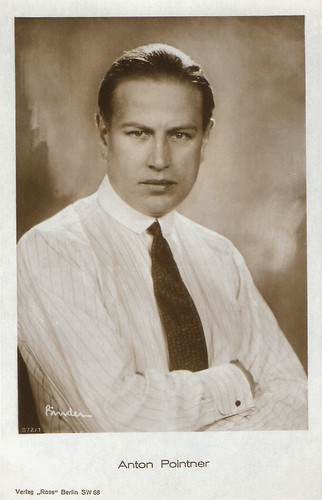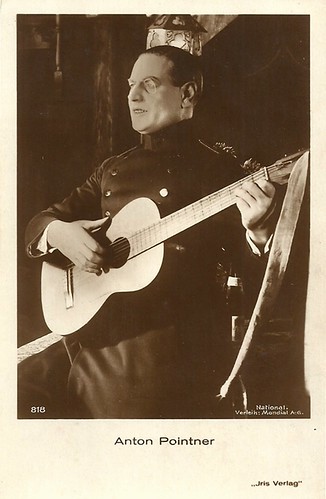
German postcard by Ross Verlag, Berlin, no. 872/1, 1925-1926. Photo: Alex Binder.

German postcard by Ross Verlag, Berlin, no. 1579/1, 1927-1928. Photo: Atelier Hanni Schwarz.
Powerful, robust characters in mostly supporting roles
Anton Pointner was born in 1890 in Salzburg. He got his first engagement in Lahr in 1907. His other theatre stations included Pilsen (Plzeň), Düsseldorf (1911) and Brno.
Pointner then worked in Vienna and from 1920 on in Berlin. He acted for example at the Lessing Theater and the State Theatre. His roles included the title character of 'Hamlet', Melchtal in 'Wilhelm Tell', and Prince Karl-Heinz in 'Alt-Heidelberg'.
In 1911, he made his screen debut in Lebensfreude/Enjoyment of life (Reinhard Bruck, 1911) with Polaire, and produced by Düsseldorfer Film-Manufaktur Ludwig Gottschalk. It was followed by Bruck's film Halbwelt/Demimonde (Reinhard Bruck, 1911).
Pointner did a few films in Vienna during the First World War. Yet, his film career really set off immediately after the war's end.
P, with whom he acted in the episode films Die Abenteurerin von Monte Carlo/The adventurer of Monte Carlo (Adolf Gärtner, 1921), Die Frau met den Millionen/The woman with the millions (Willi Wolff, 1922-23), and Der Flug um den Erdball/The flight around the globe (Willi Wolff, 1924-25).
They also co-starred in the single films Kopf hoch, Charly!/Cheer up, Charly! (Ludwig Wolff, 1926) and Die Frau ohne Nerven/The woman without nerves (Willi Wolff, 1929).
Around 1923 Pointner acted in several films by Friedrich Zelnik, in the mid-1920s also in films of the Dutch emigré directors Theo Frenkel (Frauenmoral/Female morality, 1923) and Jaap Speyer (Liebeshandel/ Love trade, 1926).
He co-acted with many female stars of Weimar cinema such as Ruth Weyher, Liane and Grit Haid, Magda Sonja, Anita Dorris, Claire Rommer, Maria Jacobini, Carmen Boni, Mary Carr, Lya De Putti, Asta Nielsen, Henny Porten, and many others.
The athletic actor embodied powerful, robust characters in mostly supporting roles, as Count Leicester in Maria Stuart/Mary Queen of Scots (Friedrich Fehér, 1927) and Frederick the Great's son and heir Friedrich Wilhelm in Der alte Fritz/The Old Fritz (Gerhard Lamprecht, 1927-1928).

German collectors card by Ross Verlag in the series Vom Werden deutscher Filmkunst - Der Stumme Film, picture no. 66. Photo: Ellen-Richter-Film. Ellen Richter, Anton Pointner and Hans Brausewetter in Der flug um den Erdball/The flight around the globe (Willi Wolff, 1925).

Austrian postcard by Iris Verlag, no. 818. Photo: National / Distr. Mondial. Anton Pointner in Die Sporck'schen Jäger/The Sporck Battalion (Holger-Madsen, 1927).
German versions of American films
In 1930-1931, Anton Pointner went to Hollywood and starred in German versions of American films, most of which were directed by William or Wilhelm Dieterle.
Pointner thus acted e.g. in Die heilige Flamme (Wilhelm Dieterle, Berthold Viertel, 1931), the German version of The Sacred Flame, and Menschen hinten Gittern (Pál Fejös, 1931), the German-language version of The Big House.
Returned to Germany in 1931 he easily started in the new sound film industry, e.g. in Trenck (Heinz Paul, Ernst Neubach, 1932), and Ich bei Tag und Du bei Nacht/I by day and you by night (Ludwig Berger, 1932).
At the time of the Third Reich in Germany, Pointner continued to be used in numerous productions such as the comedy Saison in Kairo/Cairo Season (1933) with Renate Müller and Willy Fritsch, and he portrayed e.g. the Austrian Emperor Franz I in Fridericus (Johannes Meyer, 1937) starring Otto Gebühr.
In 1939 he was briefly at the Cinecittà studios in Rome for the shooting of the German-Italian production Castelli in aria/Castles in the Air (Augusto Genina, 1939), starring Lilian Harvey and Vittorio De Sica.
After an intermission at war's end, Pointner continued his film acting from 1948. During a trip to Hintersee near Berchtesgaden, Anton Pointner died of a heart attack in 1949. His body was buried in the Salzburg municipal cemetery. His last three films were released after his death. All in all, he acted in 181 films.

German postcard by Ross Verlag, no. 92/4. Photo: Henny Porten-Film / Photo Atelier Alex. Schmoll, Berlin. Henny Porten and Anton Pointner in the German silent romantic comedy Liebe und Diebe/Love and Thieves (Carl Froehlich, 1928).

German postcard by Ross Verlag, no. 92/5. Photo: Henny Porten-Film / Photo Atelier Alex. Schmoll, Berlin. Henny Porten and Anton Pointner in the German silent romantic comedy Liebe und Diebe/Love and Thieves (Carl Froehlich, 1928).
Sources: Filmportal.de, Wikipedia (German and English), and IMDb.
No comments:
Post a Comment